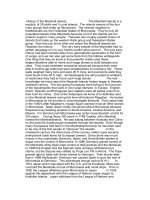instrumental history of the drums
Bạn đang xem bản rút gọn của tài liệu. Xem và tải ngay bản đầy đủ của tài liệu tại đây (22.06 KB, 1 trang )
The first instrumental drum was called a timpani or kettledrums.This
drums origin is of Eastern origin. Small kettledrums were introducedinto
Europe as early as the 13th century.The European kettledrum , which is
used in American orchestras also, derivesits special sound from the size
and shape and diameter of its bowl. This bowl is usually made of copper
or fiberglass.Another primary drum is the snare drum. It was developed
drom double-skinneddrum of medieval times known as the tabor. This
drum, also called a side drum, has its distinctive feature several gut or
wire strings that stretch acrossthe instruments lower skin. The upperskin
is struck with a drum stick, while being struck the strings vibrate, giving
this instrument its characteristiccrisp staccato.This small medieval
instrumnet gradually increased size, about the 15th century.It was so
often combined in a performance with a fife that these two
instrumnetsbecame closely associated with one another. A fife is a small
flute havingfrom six to eight finger holes and it also has no key, used
mainly withdrums in playing marches.The tenor drum is closely related to
the snare drum. It is somewhat largerin size and it has no snares across
its lower skin. This drum is played withsofft felt covered sticks and it
produces a huskier sound. While it is occasionallyused in the orchestra
this type of drum is found more frequently in military marching bands.The
largest drum in the percussion family is the bass drum. The bass drumof
the classical era, though not equiped with snares, was infact a very
deepsnare drum that was set up in a horizontal position to be played.
This instrument was eventually replaced by the bass drum that is now
familiar a large and shallow instrument with skins on either of its two
sides. It is played in rock bands with a foot petal,that when pressed down,
makes a drum stick strike the drum.I feel that all of the drums have
evolved. They are also played in a varietyof places weather it is in a
school marching band or a punk rock band.I think that in this class I will
learn a lot more about the instrumentalhistory of the drum, than I have
while writing this paper. THE END









